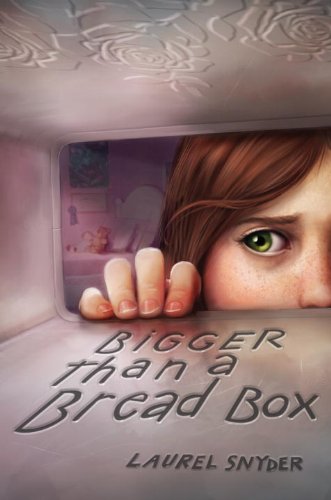Today’s guest poetry poster is Laurel Snyder.
 It breaks my heart when I talk to a kid who says they “hate poetry” or that they “can’t read poetry.” Especially if they think it’s “too hard.” Poetry is the easiest thing in the world. Or it can be. If it feels hard, and you don’t want it to (some people like for things to be hard)—you’re overthinking it.
It breaks my heart when I talk to a kid who says they “hate poetry” or that they “can’t read poetry.” Especially if they think it’s “too hard.” Poetry is the easiest thing in the world. Or it can be. If it feels hard, and you don’t want it to (some people like for things to be hard)—you’re overthinking it.
When I was little, my dad read me poems. This may well be the single greatest thing he ever did for me. He read me Blake’s Songs of Innocence. He read me The Fairies. But most of all, he read me Yeats. Night after night. The Song of Wandering Aengus. Long before I knew what any of it meant, each night, until I fell asleep.
It wasn’t until years later that I realized how much I’d stolen from Yeats, by accident. How often, as I write my own poems, I come back to his meter. How often, in a novel, I find myself inserting a silver fish or an apple. How often things “glimmer.” These words and images, branded into my brain, long before I could think about them as a writer. I often have to edit out the Yeats.
But this leads me to wonder how much that early love of words itself came from those nightly readings. Not because the specific poems mattered so much. But because, when I was young enough that anything delivered in a loving way was received happily, I was given poems. They belonged to me, as much as Itsy Bitsy Spiders or Smurfs or Angry Birds belong to some kids. So of course they weren’t hard for me. They were just part of childhood.
Hollow lands and hilly lands! Hollow lands and hilly lands! Hollow lands and hilly lands! Hollow lands and hilly lands! Hollow lands and hilly lands! Hollow lands and hilly lands! Hollow lands and hilly lands! Spin around in your backyard, screaming that, in bare feet, and see how many times you can do it until you fall down, dizzy. Do you think that’s hard? Well, that is how I experienced poetry. Singing it to myself while the blood rushed in my ears and I tore down a hill on my bike. Or as I swam in the neighborhood pool.
Poetry is like any other art form. You take it in, and then you’re in charge of what you do with it. Some people hear music, and it makes them dance. Some people hear music and it makes them cry. Some people hear music and it makes them want to go for a run. Some people hear music and try to understand it. But not all of them!
I wish I could go back in time and read every kid a poem ten times before they turn three. Unfortunately I can’t. But I’d encourage every kid reading this to try doing something else with a poem. Something besides trying to understand it, in a homework-sort-of-way.
Not that there’s anything wrong with homework! But if that’s the only way you encounter something, that’s the only way you encounter it. Hey—I bet if you had to write a homework assignment about Angry Birds, you’d find that a little harder too!




8 Comments
Joanna
Yes. Fabulous post!
Janet F.
Thank you so much for this post, Katie and Laurel, and the video of you reciting Yeats! I had a sllightly similar experience with my mother and poetry as a child, though mine was more limited to the nursery rhymes and de la Mare’s “Sea Fever”. (I wish I had heard Yeats!)Towards the end of my long teaching career I discovered by chance that 3rd graders would happily, easily and eagerly learn poetry by heart. Poem after amazing poem with no homework, requirement, pressure or test! (And it was NOT rote learning!) We have and had poetry at the heart of the classroom and throughout the year. Eventually I found that children had developed a knack for writing poetry which I think comes from being immersed in it. I am new to the blogosphere, (and must get started) but have talked at many conferences across the country lately. I hope to inspire other teachers with my simple approach to bringing poetry into the daily life of the classroom. Like you, they hear the poem a number of times before they say it with me or see it. It has an impact on their reading, vocabulary and other learning, too. They easily learn over 40 poems in a year AND it does not take a lot of time! I am happily catching up on many blogs and finding new poems and poets in the kidslitosphere and it warms my heart!! I had been seeking “my” community and am so glad to have found it. I am going to show your post to the classes I now work with!! They know “The Lake Isle of Innisfree”! I agree with everything you wrote about reading and sharing all kinds of poems with little ones. I think the impact is powerful!
katie
I LOVED reading this, Janet! Amazing that they learned 40 poems! That made me gasp!
david e
in fifth and sixth grade i was deep in nonsense poetry, so much so that i was often trying my hand at limericks (about teachers and classmates). when i got to seventh grade i had an english teacher who required us to memorize and recite in front of class a classic poem on the order of once every three weeks. nearly 40 years later i can still recite some of those poems but a little part of my love of nonsense was knocked out of me because only “serious” poems were considered worthy of class time.
a few years later i tried my hand at parody and then loped into that sullen teen poetry boys secretly write but never share and by the time i graduated high school i didn’t feel like i had poetry in me anymore. in fact, it was an odd sensation to find myself muttering in grad school a few years ago (to julie larios no less) that i felt like i had the “permission” to have fun writing poetry taken away from me, like i wasn’t taking the form seriously by my love of nonsense.
poetry ends up being a lot like modern art to many people, where they don’t realize you don’t have to like every work you see, that it’s okay to laugh at a painting, that some things will speak to you if you listen. and i think we need to let kids know that like anything else, if they look around, they’ll find something they like.
and honor nonsense.
katie
David, thank you so much for sharing this. I LOVE THIS COMMENT. It’s so true! If you watch the video of me on WTNH this month which I posted earlier this week, you’ll see I said the exact same thing! I am on your Nonsense Bandwagon!
Janet F.
By the way my kids LOVE Jabberwocky and talk about nonsense! Though really there is a story and the more you read it you can figure it out. But kids adore humor! Though many are moved by more serious works, too. I find that they are welcoming to most poems, have their favorites, but are open to learning more. Keep in mind my kids learn the poems together as a group, so there is a big “safety in numbers” effect going on. No one is ever put on the spot, though we work very hard to get every word right in order to honor the poet’s hard work (and to reinforce the idea that every word in a poem is carefully chosen).
Janet F.
I so agree! One part of the beauty of poety is the range and breadth and there is something for everyone and some things everyone can at least consider in their own way. Different strokes/different folks. The explosion of poetry for children is wonderful but as a dedicated poetry-advocate teacher I have to say that unless you live in a major metropolitan area or you have an incredible school or local library, access to these new works is woefully lacking. I would encourage the poets and others in the kidslitosphere to come up with a way (if possible) to have a poetry exhibitbooth at major conferences both nationally and in states. I don’t know if this is possible, but if teachers could more easily find the wonderful books I have stumbled on (sad to admit this!), they might start to use them and poetry more. I would love to see a Poetry “Bus” similar to the old bookmobiles, that could travel around and sell books to teachers, librarians and parents and kids. Though I have no clue how something like this could work. But my point is that in the busy lives of teachers and given that there are not a preponderance of teachers who actually advocate for poetry, sadly, they need easy access to poems to use in class. My dream evolved and continues to evolve, which is to bring the appeal (love?) of poetry back into the common culture. When I do return visits to classrooms in our local area the teachers tell me the children cheer because they will get to “do poetry” again. I think it is essential to sow seeds early, but with a breadth of poems and with the pressure off. I treat my sharing of a new poem as an opportunity, an invitation and once the kids come to know the poem, then we can slip in some “educational” things like terms, forms, etc. But once they are excited about a topic, they generally want to know more. I could go on and on. And again, I am so happy to have found such amazing work here and I say thank you again to Ed at March Madness Poetry and Heidi from My Little Juicy Universe for drawing me in finally!!
Elizabeth
What a lovely poem! I wish I’d been read poetry as a child too! 🙂 e